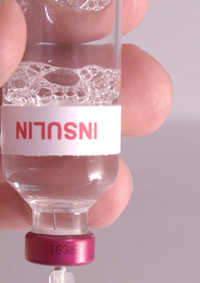“Our team has applied the perspective of biomedical engineering to the biochemistry of a therapeutic protein. The new insulin is engineered to optimize its nano-scale properties.”
A Smarter Insulin
Professor Michael Weiss invents a zinc-stapled insulin that reduces cancer risks
 The daily act of injecting a shot into the abdomen or thigh to deliver insulin has
helped regulate blood glucose levels for millions of individuals with diabetes the
world over, keeping their disease in check and their lives healthier. Yet recent
studies have shown that an excess amount of insulin in the body of obese patients
is associated with an increased risk of several common cancers, including those of
the breast and colon. This has raised concern that large doses of injected insulin,
especially long-acting formulations—currently the largest and most rapidly growing
class of prescribed insulin products—may also promote the growth of cancer cells.
The daily act of injecting a shot into the abdomen or thigh to deliver insulin has
helped regulate blood glucose levels for millions of individuals with diabetes the
world over, keeping their disease in check and their lives healthier. Yet recent
studies have shown that an excess amount of insulin in the body of obese patients
is associated with an increased risk of several common cancers, including those of
the breast and colon. This has raised concern that large doses of injected insulin,
especially long-acting formulations—currently the largest and most rapidly growing
class of prescribed insulin products—may also promote the growth of cancer cells.
A research team at Case Western Reserve University School of Medicine engaged in "designing" improved insulin formulations—including an ultra-stable version that doesn't degrade at high temperatures—sought to construct a long-acting insulin that wouldn't increase the risk of cancer, even at high doses. Led by Michael Weiss, MD, PhD, the Cowan-Blum Professor of Cancer Research and chair of the biochemistry department, the team applied innovative biomedical engineering principles to create a "smart" insulin molecule that binds less tightly to cancer-related receptors than ordinary insulin and has a built-in system that uses zinc ions to "staple" the insulin under the skin to provide a slow-release form of therapy.
"It's quite a novel mechanism," says Weiss. "Our team has applied the perspective of biomedical engineering to the biochemistry of a therapeutic protein. The new insulin is engineered to optimize its nano-scale properties."
The approach used—engineered zinc staples—could also be applied to other injectable drugs for the treatment of a variety of diseases, including cancers and immune deficiencies. "The goal of all medications is to make therapeutic molecules more selective—more effective with less complications," says Weiss, "and we're seeking to accomplish this with our smarter insulin molecule."
See more of the picture: Read more at Medicus.

